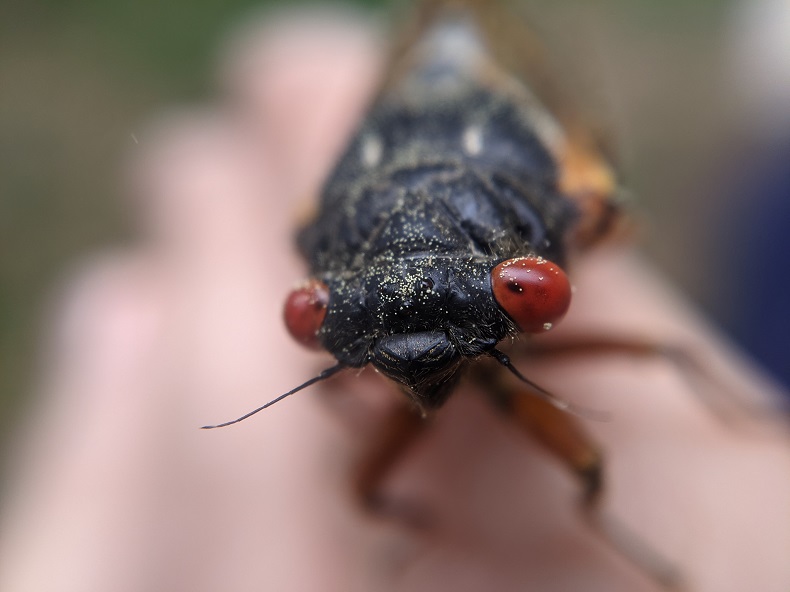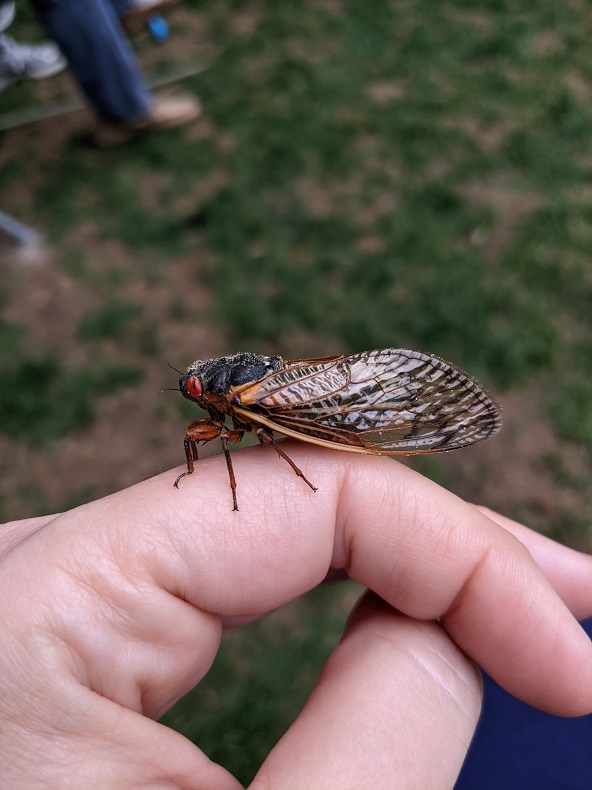
I don’t actually remember that much about the cicadas’ last visit, in 2004. I remember turning onto my parents’ street and noticing how loud the trees were, filled with chorusing insects. But not much about the bugs themselves.
Mostly what I remember is trying to convince bug skeptics that a cool thing was happening. My argument: It’s a fantastic biological event–our version of the wildebeest migration on the Serengeti. It’s epic, and it’s all around us, and it’s worthy of appreciation even if you don’t like bugs. I trotted out this argument a lot this spring, as articles circulated on the internet foretelling doom! Terror! The skies filling with insects!
A few weeks ago I went over to a nearby house to sing with a bunch of friends in the backyard. It was the first weekend that the cicadas had started chorusing from the trees, and we joked about doing every song in E flat along with them. Red-eyed adult cicadas were crawling on the picnic table, on the stairs to the back door, through the grass. I picked one up and it walked around tickling my hand with its grippy velcro feet, then flew away.
I picked up another and it stayed. I admired its wide-set red eyes, its delicate legs, its perfect, leaded-glass wings. I felt protective toward this little bug that couldn’t even be bothered to clean the pollen grains off its face. It had spent almost its entire life to this point underground, and here it was, out in the air, with wings–can you imagine?

It seemed happy to rest on my finger. When I was ready to leave, I put it on a branch of a small tree. It seemed happy there, too.
It’s hard to explain why you love something so much. I probably shouldn’t even try. I love their little faces, with those bright red eyes. Their ungainly, stubby bodies. I love how bad they are at flying, loudly buzzing through the air in hopes of landing legs-out on a hospitable surface. And they’re utterly harmless.
The other day I was walking back from exercise class, and there was a cicada in the middle of the sidewalk. Squished cicadas are all over, so if I see a live one on a walkway, I’ll often pick it up and put it somewhere safe. The move came back to me from 1987, when I played with this bug’s grandparents: a quick pinch to pin the wings near the top, so they can’t struggle.
If you pick up a male, it will often make a distress call. This amuses me. I’m saving this guy’s life, and he’s yelling at me. Ok, buddy. Yes, you’re cranky. How about I rescue you, and you can go do your mating call, and we never have to talk again.
So I put him on a leaf of a nearby tree, leg side down. He immediately let go of the leaf and crash-landed into the sidewalk, right back where it started. I picked him up again, walked him over to the trunk, and set him on top of a horizontal branch, close to a friend. When I let go, he let go, knocking the other cicada off the branch, and they both fell onto the grass. Fine. At least it wasn’t the sidewalk. I left them there.
The cicadas are only here for a short time. I hear they’ll be gone by the end of the June. Some people say they’re already on the decline, already getting quieter. My heart can’t take it. I want this moment to go on and on. And I also want it to pass, so I can look forward to the next generation.
In April, the crabapple across the street from my apartment building had the most glorious blooms and buzzed with bees. Now its branches are covered with cicadas, chorusing together, springing into flight, landing again. I’ve gone out there the last few evenings to watch and listen. I can see where the females have dug fresh notches into the skinny branches to lay their eggs. Over the last month, bits of memories have come back; a little later in the summer, I realized, the tips of that tree’s branches are going to be hanging down, dead, after their once-every-17-years pruning.
I’ll be 62 the next time the bugs come along, an unimaginable age. I suppose 45 was unimaginable in 2004, and 28 was unimaginable in 1987. It’s the obvious essay topic, in this time, to stop and think about where I was in 2004 and where I am now. Only a few miles away, but 17 years wiser, I guess.
Sometimes I wonder just what my life is for. What is anyone’s life for? And this must be part of it: To love these sweet, bumbling bugs, and to tell you about it.
Photos and video: Helen Fields
Beautifully put. And I whole heartedly agree that these bugs tickle the heartstrings while playing the maracas. I do the same thing: pick up the stragglers sitting unconcernedly on the sidewalk amongst their squished brethren and sistren, place them on a nearby tree, or take them for a walk. There may be millions of them out there, but I think each one I save just helps increase the chances that there will be millions of them again in 2038.
Does removing a bug from a sidewalk filled with other squashed bugs thwart the evolutionary process of learning to get off the damn concrete where all other dead ones are? Discuss!
Do cicadas even have the neural feedback that would allow them to learn? They seem like they can have only one thing on their minds at any given time.
They have become unavoidable up in WV. At night they grumble, mini golf balls shot into the window screen with a dull sprongggg. I knock them off just to hear the boys complain as the ping off into the dark.
The dozens of little bodies piled up at my doorstep every morning is making me sad. I cheer every one that miraculously flings over my windshield, unscathed, when I drive. I’m going to miss their song.
I love them for so many reasons. One of which is, the chipmunks are so fat and happy this year, I’ve harvested a whole basket of strawberries from my front garden for the first time.
Plenty of other insects have chemical receptors that can detect other dead/dying insects from their species nearby, and so either attack the predator or flee from the area. If the one you saved just dropped right back on the sidewalk, then knocked another off its perch the second time, seems like maybe that one would be better left where it was?
I was in Maryland when the cicadas last appeared in 2004. I remember how loud they were! No sign of them here in NYC. Your story makes me remember and feel like I’m missing out now.
I never liked stepping on their crunchy little body armour.
Truth is I hear their “song” all of the time. It’s called Tinnitus and it will be a joy for me to know that this time it is real and not just in my head.
And now, I have another thing to worry about…will the next brood of cicadas recognise the world they will (may?) hatch into? In 17 years, we might have damaged our world too much for some orders of life…
I am one year younger than Helen and grew up here too. I also tried to establish what note they were singing (the closer you listen the harder it is ;)). I too have looked at this emergence as a marker of eras in my life, fast vanishing. I too made a video of a tree. Thank you Helen, for saying these words.
What a wonderful story and sentiment! I love these bugs too, and people think I’m crazy. My husband won’t even touch one. I love when they walk on my hand, when I look in their big, bright red-eyed tree-frog-like eyes, wondering what they see when they look at me. Do they realize there are some of us who would not harm them at all? That enjoy their eerie song? Their toddler clumsiness? Probably not. But I do, and I, too, will miss them when they’re gone.